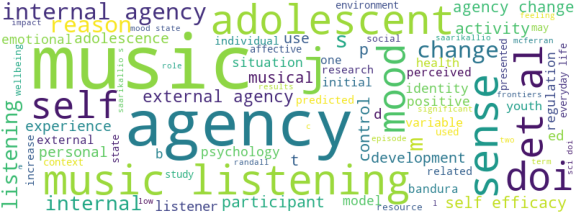| Id | 760 | |
| Author | Saarikallio S.H., Randall W.M., Baltazar M. | |
| Title | Music Listening for Supporting Adolescents’ Sense of Agency in Daily Life | |
| Reference | Saarikallio S.H., Randall W.M., Baltazar M.; Music Listening for Supporting Adolescents’ Sense of Agency in Daily Life ;Frontiers in Psychology vol:10 issue: page: |
|
| Link to article | https://www.scopus.com/inward/record.uri?eid=2-s2.0-85079016322&doi=10.3389%2ffpsyg.2019.02911&partnerID=40&md5=57310f5cbf277d7446ad131967b41567 |
|
| Abstract | Sense of agency refers to the ability to influence one’s functioning and environment, relating to self-efficacy, and wellbeing. In youth, agency may be challenged by external demands or redefinition of self-image. Music, having heightened relevance for the young, has been argued to provide feelings of self-agency for them. Yet, there is little empirical research on how music impacts adolescents’ daily sense of agency. The current study investigated whether music listening influences adolescents’ perceived agency in everyday life and which contextual determinants would explain such an influence. Participants were 44 adolescents (48% female, 36% with training in music, mean age 14), recruited through local schools. The mobile Experience Sampling app MuPsych was used to collect brief self-reports of personal music listening experiences during daily life. This method assessed the change in the listener’s perceived control over both their emotional states (internal agency), and their external environment (external agency), over 5 min of music listening. Also measured were changes in mood states, and contextual variables (social situation, concurrent activity, and reason for listening). The impact of music on the sense of agency was analyzed using multilevel structural equation modeling. There was no general increase of agency across all music episodes, but agency fluctuations were determined by specific contextual factors. External agency change was predicted negatively by changing environments, while internal agency change was predicted by initial mood and various reasons for listening, including for enjoyment, coping, and enhancing current mood state. Our findings confirmed the plasticity and situational embeddedness of the sense of agency. Music indeed can support agency, but the impact is dependent on a range of situational factors. Sense of agency can be seen as a health resource and significant part of youth development, and current findings provide new insight into when and by which conditions such affordance is likely to be employed. © Copyright © 2020 Saarikallio, Randall and Baltazar. |
|
| Keywords | adolescents; everyday life; experience sampling; music listening; sense of agency |
Wordcloud:



